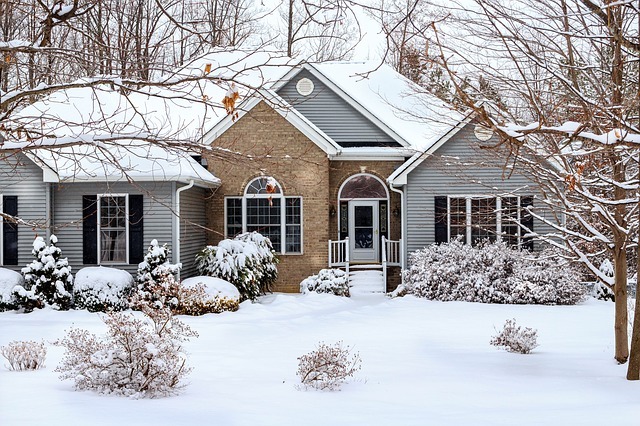
Get your home ready for freezing weather hazards with these simple tips:
Ice, snow and wind can have devastating consequences to your home—and to your household budget. Fortunately, there are precautions you can take to avoid the expense and inconvenience of winter damage—and even help you save on heating costs. Get started when the leaves begin to turn so your home is well prepared when the cold, harsh weather hits.
Winter weather prep for the outside of your home
When temperatures drop dramatically and the snow flies, you'll be glad to have taken these measures to safeguard your house.
- Clean out the gutters. Remove leaves, sticks and other debris from gutters, so melting snow and ice can flow freely. This can prevent ice damming, which is what happens when water is unable to drain through the gutters and instead seeps into the house causing water to drip from the ceiling and walls.
- Install gutter guards. Gutter guards prevent debris from entering the gutter and interfering with the flow of water away from the house and into the ground.
- Trim trees and remove dead branches. Ice, snow and, wind could cause weak trees or branches to break free and damage your home or car, or injure someone walking by your property.
- Repair steps and handrails. Broken stairs and banisters can become lethal when covered with snow and ice.
- Use caulking to seal cracks and wall openings to prevent cold air and moisture from entering your home. Caulk and install weather stripping around windows and doors to prevent warm air from leaking out and cold air from blowing in.
Winter weather prep for the inside of your home
Frigid temperatures, snow and ice can wreak havoc on water pipes and tax heating systems. Ensure all your home's internal systems are "go" for winter safety and efficiency.
- Add extra insulation to attics, basements and crawl spaces. If too much heat escapes through the attic, it can cause snow or ice to melt on the roof. Water then can refreeze, leading to more ice build-up—and may even lead to ice dams that can damage your roof. Well-insulated basements and crawl spaces will also help protect pipes. Consider insulating garages and other unfinished areas to keep pipes from freezing.
- Provide a reliable back-up power source. In the event of a power outage, continuous power will keep you warm and help to prevent frozen pipes, or a frozen battery operated sump-pump. Consider purchasing a portable power generator to ensure safety—and be sure to follow all guidelines for safe operation.
- Have your heating system serviced. Furnaces, boilers and chimneys should be serviced at least once a year to prevent fire and smoke damage.
- Check pipes closely for the presence of cracks and leaks. Have any compromised pipe repaired immediately.
- Protect pipes in attics and crawl spaces with insulation or plug-in heating cable. Be sure to purchase UL®-listed models of heating cables with built-in thermostats; these will turn on the heat on when it is needed. When using the cables, always follow manufacturers instructions closely.
- Install an emergency pressure release valve in your plumbing system. This will protect the system against increased pressure caused by freezing pipes and can help prevent your pipes from bursting.
- Move combustible items away from near any heat sources that you'll likely be using. This includes fireplaces, wood stoves and space heaters.
- Install or check smoke and carbon monoxide detectors. Not only do residential fires increase in the winter, but so does carbon monoxide poisoning—so regularly check that your detectors are in working condition.
- Know where your pipes are located and learn how to shut the water off. If your pipes freeze, speed is critical. The quicker you shut off water or direct your plumber to the problem, the better your chance of preventing major damage.
- Hire a licensed contractor to look for structural damage. If damage is found, have all necessary repairs performed as soon as possible.
- Take steps to prevent flooding. Your licensed contractor can also advise you about measures to prevent flooding from melted snow and ice runoff. Plastic coatings for internal basement walls, sump pumps and other improvements can prevent water damage to your home and belongings.
- Consider insuring yourself for a sewer backup. Flooding related to melting snow can overburden sewer systems. Raw sewage backed up into the drains in your home can cause thousands of dollars in damage to floors, walls, furniture and electrical systems. Sewer backup is not covered under standard homeowners insurance or renters insurance policies, nor is it covered by flood insurance but can be purchased as either a separate product, or an endorsement.
The information in this article was obtained from Insurance Information Institute and is not all inclusive regarding the subject matter. This content is offered for educational purposes only and does not represent contractual agreements, nor is it intended to replace manuals or instructions provided by the manufacturer or the advice of a qualified professional. The definitions, terms and coverage in a given policy may be different than those suggested here and such policy will be governed by the language contained therein. No warranty or appropriateness for a specific purpose is expressed or implied.
Source: Insurance Information Institute www.iii.org https://www.iii.org/article/pr...

